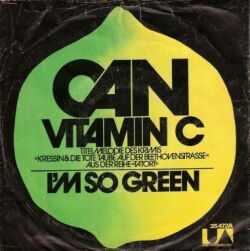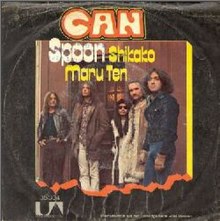
Sonic Youth was an American rock band based in New York City and formed in 1981. Founding members Kim Gordon, Thurston Moore and Lee Ranaldo remained together for the entire history of the band, while Steve Shelley (drums) followed a series of short-term drummers in 1985, rounding out the core line-up. Jim O'Rourke was also a member of the band from 1999 to 2005, and Mark Ibold was a member from 2006 to 2011.

MC5 is an American rock band formed in Lincoln Park, Michigan, in 1963. The classic line-up consisted of vocalist Rob Tyner, guitarists Wayne Kramer and Fred "Sonic" Smith, bassist Michael Davis, and drummer Dennis Thompson. MC5 were listed by Parade as one of the best rock bands of all time and by VH1 as one of the greatest hard rock artists of all time. The band's first three albums are regarded by many as staples of rock music, and their 1969 song "Kick Out the Jams" is widely covered.

Delirious? were an English contemporary Christian band. For the majority of their career, the lineup featured Martin Smith on vocals and guitar, Stu G on guitar and backing vocals, Jon Thatcher on bass guitar, Tim Jupp on keys and piano, and Stew Smith on drums and percussion. During their final two years, drumming duties were assumed by Paul Evans.

Can were a German experimental rock band formed in Cologne in 1968 by Holger Czukay, Irmin Schmidt (keyboards), Michael Karoli (guitar), and Jaki Liebezeit (drums). The group featured several vocalists, including the American Malcolm Mooney (1968–70) and the Japanese Damo Suzuki (1970–73). They have been widely hailed as pioneers of the German krautrock scene.
A greatest hits album or best-of album is a type of compilation album that collects popular and commercially successful songs by a particular artist or band. While greatest hits albums are typically supported by the artist, they can also be created by record companies without express approval from the original artist as a means to generate sales. They are typically regarded as a good starting point for new fans of an artist, but are sometimes criticized by longtime fans as not inclusive enough or necessary at all.

Fischerspooner were an electroclash duo and performance troupe formed in 1998 in Chicago after meeting in school. The name is a combination of the founders' last names, Warren Fischer and Casey Spooner.

Kenji Suzuki, known as Damo Suzuki (ダモ鈴木), was a Japanese musician best known as the vocalist for the German Krautrock group Can between 1970 and 1973. Born in 1950 in Kobe, Japan, he moved to Europe in the late 1960s where he was spotted busking in Munich, West Germany, by Can bassist Holger Czukay and drummer Jaki Liebezeit. Can had just split with their vocalist Malcolm Mooney, and asked Suzuki to sing over tracks from their 1970 compilation album Soundtracks. Afterwards, he became their full time singer, appearing on the three influential albums Tago Mago (1971), Ege Bamyası (1972) and Future Days (1973).

Pop Will Eat Itself are an English alternative rock band formed in 1986 in Stourbridge in the West Midlands of England with members from Birmingham, Coventry and the Black Country. Initially known as a grebo act, they changed style to incorporate sample-driven indie and industrial rock. Graham Crabb describes their sound as "electronic, punk, alternative hip-hop, hybrid music for fucking, fighting & smoking cigars". Their highest-charting single was the 1993 top-ten hit "Get the Girl! Kill the Baddies!". After initially disbanding in 1996, and having a brief reformation in 2005, they issued their first release in more than five years in 2010.

Neu! were a West German krautrock band formed in Düsseldorf in 1971 by Klaus Dinger and Michael Rother following their departure from Kraftwerk. The group's albums were produced by Conny Plank, who has been regarded as the group's "hidden member". They released three albums in their initial incarnation—Neu! (1972), Neu! 2 (1973), and Neu! 75 (1975)—before disbanding in 1975. They briefly reunited in the mid-1980s.

Trilogy is the third studio album by English progressive rock supergroup Emerson, Lake & Palmer, released in June 1972, by Island Records. The group had spent most of 1971 touring, and paused in September so they could record a new album at Advision Studios with Eddy Offord resuming his role as engineer. It would be his last with the group, as he later elected to work full-time with Yes. The album features "Hoedown", an arrangement of Aaron Copland's ballet composition which became a live favourite.

Monster Movie is the debut studio album by German rock band Can, released in August 1969 by Music Factory and Liberty Records.

Sonic Youth is the debut EP by American rock band Sonic Youth. It was recorded between December 1981 and January 1982 and released in March 1982 by Glenn Branca's Neutral label. It is the only recording featuring the early Sonic Youth lineup with Richard Edson on drums. Sonic Youth differs stylistically from the band's later work in its greater incorporation of clean guitars, standard tuning, crisp production and a post-punk style.

Tago Mago is the second studio album by the German krautrock band Can, originally released as a double LP in August 1971 on the United Artists label. It was the band's first studio album to feature Damo Suzuki after the 1970 departure of previous vocalist Malcolm Mooney. Recorded in a rented castle near Cologne, the album features long-form experimental tracks blending rock improvisation, funk rhythms, and musique concrète techniques.

Ege Bamyası is the third studio album by German krautrock band Can, originally released as an LP in 1972 by United Artists. The album contains the single "Spoon", which charted in the Top 10 in Germany owing its use as the theme of German TV thriller mini-series Das Messer. The success of the single allowed Can to move to a better studio in Weilerswist, where they recorded the rest of the album.

"Love" is a song written and performed by John Lennon, originally released on his debut solo album John Lennon/Plastic Ono Band (1970). The song's theme is more upbeat than most of the songs on Plastic Ono Band.

"Vitamin C" is a song by the krautrock band Can on their 1972 album Ege Bamyası. Considering its short length and relatively standard song structure, it is one of the band's more conventional songs.
This is a discography of the krautrock band Can.
Spoon Records is an independent record label managed by Hildegard Schmidt, wife of keyboard player Irmin Schmidt, since 1979, on which music by the krautrock band Can and its members has been released and re-released. It takes its name from the song "Spoon" on Can's Ege Bamyasi album. Hildegard and Irmin Schmidt's daughter Sandra Podmore has been director of Spoon Records since 2008.
"Superstar" is a 1969 song written by Bonnie Bramlett and Leon Russell, with a songwriting credit also given to Delaney Bramlett, that has been a hit for many artists in different genres in the years since. The best-known versions are by the Carpenters in 1971, and by Luther Vandross in 1983.
Wishful Thinking are a British rock band, originally formed in the 1960s.















